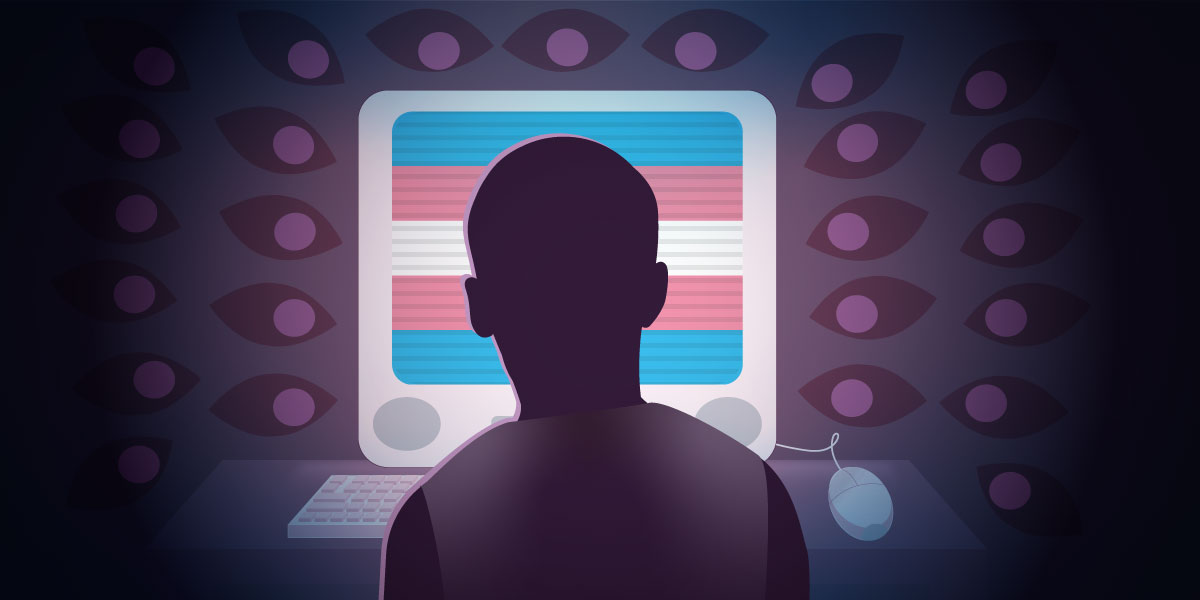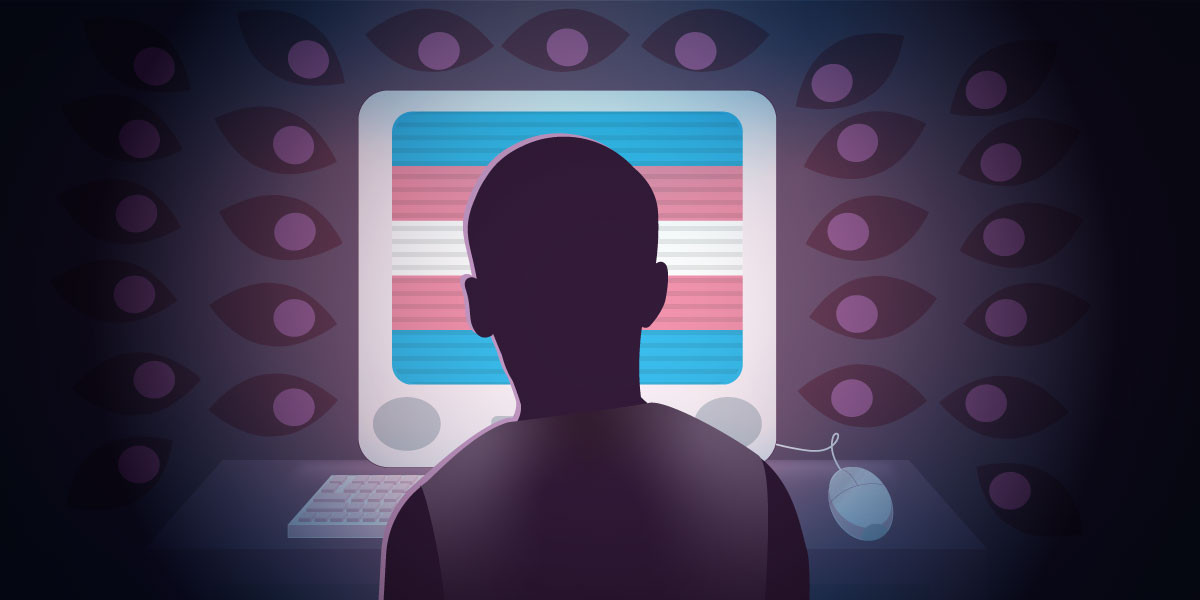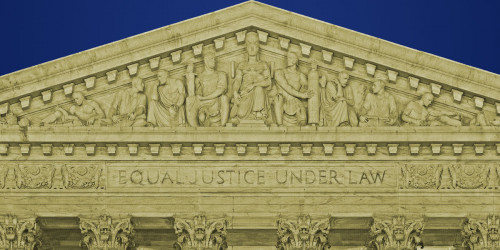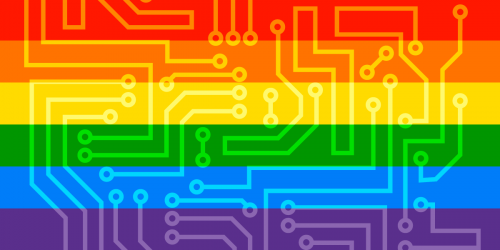Today's Supreme Court’s ruling in U.S. v. Skrmetti upholding bans on gender-affirming care for youth makes it clear: trans people are under attack. Threats to trans rights and healthcare are coming from legislatures, anti-trans bigots (both organized and not), apathetic bystanders, and more. Living under the most sophisticated surveillance apparatus in human history only makes things worse. While the dangers are very much tangible and immediate, the risks posed by technology can amplify them in insidious ways. Here is a non-exhaustive overview of concerns, a broad-sweeping threat model, and some recommended strategies that you can take to keep yourself and your loved ones safe.
Dangers for Trans Youth
Trans kids experience an inhumane amount of cruelty and assault. Much of today’s anti-trans legislation is aimed specifically at making life harder for transgender youth, across all aspects of life. For this reason, we have highlighted several of the unique threats facing transgender youth.
School Monitoring Software
Most school-issued devices are root-kitted with surveillance spyware known as student-monitoring software. The purveyors of these technologies have been widely criticized for posing significant risks to marginalized children, particularly LGBTQ+ students. We ran our own investigation on the dangers posed by these technologies with a project called Red Flag Machine. Our findings showed that a significant portion of the times students’ online behavior was flagged as “inappropriate” was when they were researching LGBTQ+ topics such as queer history, sexual education, psychology, and medicine. When a device with this software flags such activity it often leads to students being placed in direct contact with school administrators or even law enforcement. As I wrote 3 years ago, this creates a persistent and uniquely dangerous situation for students living in areas with regressive laws around LGBTQ+ life or unsafe home environments.
The risks posed by technology can amplify threats in insidious ways
Unfortunately, because of the invasive nature of these school-issued devices, we can’t recommend a safe way to research LGBTQ+ topics on them without risking school administrators finding out. If possible, consider compartmentalizing those searches to different devices, ones owned by you or a trusted friend, or devices found in an environment you trust, such as a public library.
Family Owned Devices
If you don’t own your phone, laptop, or other devices—such as if your parents or guardians are in control of them (e.g. they have access to unlock them or they exert control over the app stores you can access with them)— it’s safest to treat those devices as you would a school-issued device. This means you should not trust those devices for the most sensitive activities or searches that you want to keep especially private. While steps like deleting browser history and using hidden folders or photo albums can offer some safety, they aren’t sure-fire protections to prevent the adults in your life from accessing your sensitive information. When possible, try using a public library computer (outside of school) or borrow a trusted friend’s device with fewer restrictions.
Dangers for Protestors
Pride demonstrations are once again returning to their roots as political protests. It’s important to treat them as such by locking down your devices and coming up with some safety plans in advance. We recommend reading our entire Surveillance Self-Defense guide on attending a protest, taking special care to implement strategies like disabling biometric unlock on your phone and documenting the protest without putting others at risk. If you’re attending the demonstration with others–which is strongly encouraged–consider setting up a Signal group chat and using strategies laid out in this blog post by Micah Lee.
Counter-protestors
There is a significant push from anti-trans bigots to make Pride month more dangerous for our community. An independent source has been tracking and mapping anti-trans organized groups who are specifically targeting Pride events. While the list is non-exhaustive, it does provide some insight into who these groups are and where they are active. If one of these groups is organizing in your area, it will be important to take extra precautions to keep yourself safe.
Data Brokers & Open-Source Intelligence
Data brokers pose a significant threat to everyone–and frankly, the entire industry deserves to be deleted out of existence. The dangers are even more pressing for people doing the vital work advocating for human rights of transgender people. If you’re a doctor, an activist, or a supportive family member of a transgender person, you are at risk of your own personal information being weaponized against you. Anti-trans bigots and their supporters online will routinely access open-source intelligence and data broker records to cause harm.
You can reduce some of these risks by opting out from data brokers. It’s not a cure-all (the entire dissolution of the data broker industry is the only solution), but it’s a meaningful step. The DIY method has been found most effective, though there are services to automate the process if you would rather save yourself the time and energy. For the DIY approach, we recommend using Yael Grauer’s Big Ass Data-Broker Opt Out List.
Legality is likely to continue to shift
It’s also important to look into other publicly accessible information that may be out there, including voter registration records, medical licensing information, property sales records, and more. Some of these can be obfuscated through mechanisms like “address confidentiality programs.” These protections vary state-by-state, so we recommend checking your local laws and protections.
Medical Data
In recent years, legislatures across the country have moved to restrict access to and ban transgender healthcare. Legality is likely to continue to shift, especially after the Supreme Court’s green light today in Skrmetti. Many of the concerns around criminalization of transgender healthcare overlap with those surrounding abortion access –issues that are deeply connected and not mutually exclusive. The Surveillance Self-Defense playlist for the abortion access movement is a great place to start when thinking through these risks, particularly the guides on mobile phone location tracking, making a security plan, and communicating with others. While some of this overlaps with the previously linked protest safety guides, that redundancy only underscores the importance.
Unfortunately, much of the data about your medical history and care is out of your hands. While some medical practitioners may have some flexibility over how your records reflect your trans identity, certain aspects like diagnostic codes and pharmaceutical data for hormone therapy or surgery are often more rigid and difficult to obscure. As a patient, it’s important to consult with your medical provider about this information. Consider opening up a dialogue with them about what information needs to be documented, versus what could be obfuscated, and how you can plan ahead in the event that this type of care is further outlawed or deemed criminal.
Account Safety
Locking Down Social Media Accounts
It’s a good idea for everyone to review the privacy and security settings on their social media accounts. But given the extreme amount of anti-trans hate online (sometimes emboldened by the very platforms themselves), this is a necessary step for trans people online. To start, check out the Surveillance Self-Defense guide on social media account safety.
We can’t let the threats posed by technology diminish our humanity and our liberation.
In addition to reviewing your account settings, you may want to think carefully about what information you choose to share online. While visibility of queerness and humanity is a powerful tool for destigmatizing our existence, only you can decide if the risk involved with sharing your face, your name, and your life outweigh the benefit of showing others that no matter what happens, trans people exist. There’s no single right answer—only what’s right for you.
Keep in mind also that LGBTQ expression is at significantly greater risk of censorship by these platforms. There is little individuals can do to fully evade or protect against this, underscoring the importance of advocacy and platform accountability.
Dating Apps
Dating apps also pose a unique set of risks for transgender people. Intimate partner violence for transgender people is at a staggeringly high rate compared to cisgender people–meaning we must take special care to protect ourselves. This guide on LGBTQ dating app safety is worth reading, but here’s the TLDR: always designate a friend as your safety contact before and after meeting anyone new, meet in public first, and be mindful of how you share photos with others on dating apps.
Safety and Liberation Are Collective Efforts
While bodily autonomy is under attack from multiple fronts, it’s crucial that we band together to share strategies of resistance. Digital privacy and security must be considered when it comes to holistic security and safety. Don’t let technology become the tool that enables violence or restricts the self-determination we all deserve.
Trans people have always existed. Trans people will continue to exist despite the state’s efforts to eradicate us. Digital privacy and security are just one aspect of our collective safety. We can’t let the threats posed by technology diminish our humanity and our liberation. Stay informed. Fight back. We keep each other safe.













